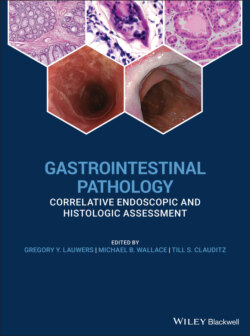Читать книгу Gastrointestinal Pathology - Группа авторов - Страница 61
Prognosis, Evolution, and Clinical Management
ОглавлениеGERD management is based on the severity and potential for complications and largely consists of lifestyle modification, anti‐acid medications or surgery. Most nonerosive or minimally erosive (Los Angeles Grade A) responds to a combination of lifestyle modifications and low‐dose (single daily proton pump inhibitor [PPI] such as omeprazole) anti‐acid therapy. Lifestyle modifications include weight loss, avoiding large meals with two to three hours of bedtime (where gravity no long prevents “upward” reflux), and minimizing specific refluxogenic foods (alcohol, mint, fatty food, chocolate, caffeine). PPI therapy is highly effective, even for severe erosive GERD but may require twice‐daily therapy. More than 95% of patients will heal erosive disease on PPI therapy.
Surgical therapy is aimed at restoring the lower esophageal sphinter pressure zone and angle of His, and reducing hiatal hernias. Surgery is also highly effective with more than 80% of individuals having sustained elimination or reduction in GERD symptoms and use of PPI. The major side effect of surgery is retention of gas in the stomach (“gas‐bloat syndrome”) due to the inability to naturally belch swallowed air.
